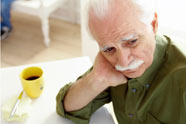Researchers have found, in an encouraging development, that one of the most popular SSRI antidepressant medications may also prove effective in relieving the symptoms of anxiety disorder in older adults. A study performed at the Washington University School of Medicine and published in the Journal of the American Medical Association was the largest of its kind to date, involving 177 adults aged 60 or older who'd been diagnosed with Generalized Anxiety Disorder (GAD).

.jpg)
GAD is a growing concern that is considerably more common among seniors: previous studies estimate that at least 10% of Americans over 60 suffer from some form of chronic clinical anxiety, and the number is almost certainly higher for primary care patients. It can disrupt daily functions beyond the primary symptoms of muscle tension, insomnia and fatigue, seriously undermining the quality of life among elderly adults. And it can be particularly painful for those living isolated or anti-social lifestyles who are more subject to prolonged periods of discomfort. A majority of the affected demographic also experiences the common pains of age like arthritis and heart disease. When coupled with chronic anxiety, these conditions become especially troubling. Perhaps most importantly, an overwhelming sense of worry can keep older adults from pursing the active social lifestyles that can so drastically improve and lengthen their lives. The issue grows even more prominent as the age of the average American rises. GAD could grow to become a major drain on our health care system by lowering success and recovery rates for unrelated conditions.
Lexapro (escitalopram) is one of the most popular SSRI antidepressants. Like many drugs in its class, it has increased GAD symptoms and even contributed to panic attacks in some clinical trials, especially with subjects new to antidepressant treatments. But in long-term treatment models it has been linked to significant symptomatic improvements in adults and adolescents suffering from GAD, and the results of this study hint at similar rates of success among the elderly. The cumulative response level among medicated subjects in the 12-week trial period was a respectable 69%, besting that of the placebo group by more than 20 points. It would appear that Lexapro has the same effect among the anxious elderly that it has among their younger counterparts. Subjects reported improvements in nearly all basic functions with lower levels of anxiety, fewer limitations on daily activities and, in an interesting development, had fewer problematic blood pressure readings. One of the study's few negatives concerned one of the most commonly reported SSRI side-effects, fatigue: 4 in 10 subjects reported occasional states of daytime drowsiness while on the drug. On the other hand, researchers noted that these negative side-effects were not nearly as severe as those associated with the powerful sedatives like Valium and Xanax that are far more commonly prescribed to elderly subjects with GAD.
Researchers cautiously labeled the drug's benefits as "modest," but they also reported that one of the main reasons their numbers were not more impressive was that many of the study's subjects did not adhere to their medications as prescribed, skipping doses or stopping the drug altogether. Future research is needed to clarify Lexapro's degree of influence in reducing the symptoms of GAD and more carefully controlled studies will almost certainly lead to higher success rates. In the meantime, curious patients and their caregivers should feel free to consult their doctors about the possibilities of SSRI treatment for generalized anxiety.
